#ibn battuta
Text
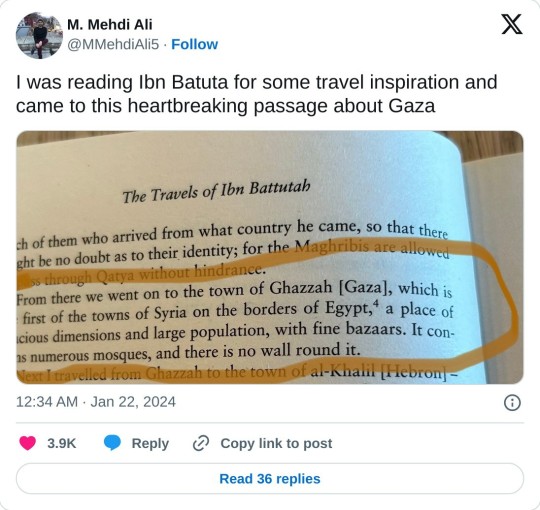

Ibn Battuta was a 14th century traveller who wrote the Riḥlah, one of the most famous travelogues ever
#yemen#jerusalem#tel aviv#current events#palestine#free palestine#gaza#free gaza#news on gaza#palestine news#news update#war news#war on gaza#Ibn battuta#History#Travel
2K notes
·
View notes
Photo
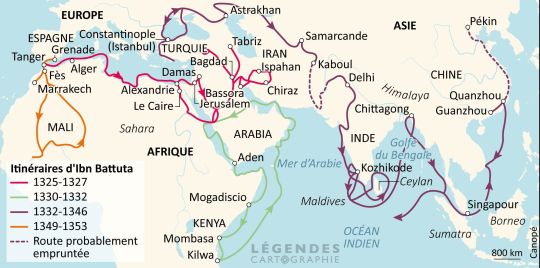
The travels of Ibn Battuta.
by LegendesCarto
128 notes
·
View notes
Quote
Traveling—it leaves you speechless, then turns you into a storyteller.
Ibn Battuta, The Travels of Ibn Battutah
69 notes
·
View notes
Text
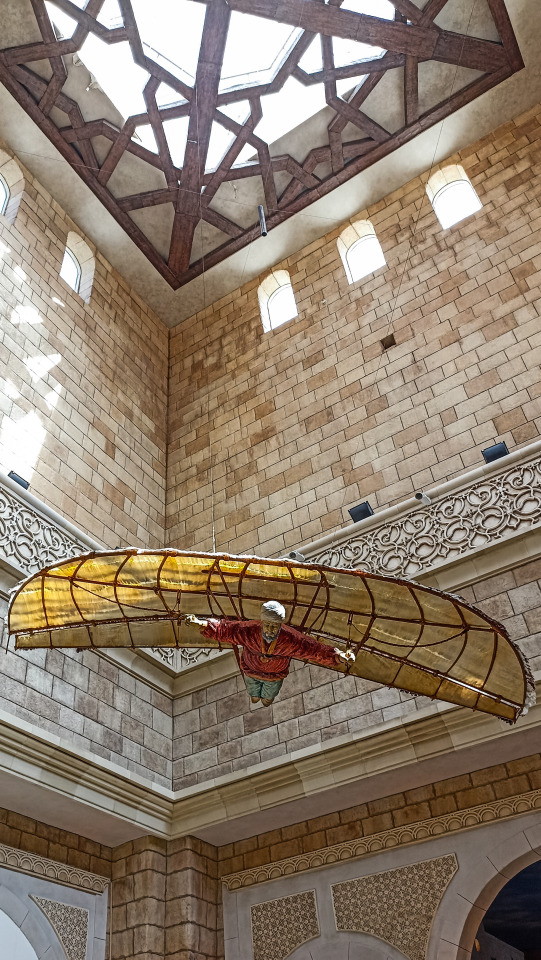
© Paolo Dala
Ibn Battuta Mall's Tribute To Abbas Ibn Firnas
According to Britannica (2023), Abu Abdullah Muhammad ibn Battuta is:
the greatest medieval Muslim traveler and the author of one of the most famous travel books, the 'Riḥlah' (Travels). His great work describes his extensive travels covering some 75,000 miles (120,000 km) in trips to almost all of the Muslim countries and as far as China and Sumatra (now part of Indonesia).
He's basically the Islamic version of Marco Polo and in Dubai he has a mall named after him... and to me, despite it being considered a mall for the masses in Dubai), it's one of the most beautiful malls I've seen.
Ibn Battuta Mall is like a World Expo and a museum, where every mall section has a different country theme... Iike in one section of the mall, you can see in the ceiling a statue of the world's first pilot, Abbas ibn Firnas, doing test one the first glider ever crated... It's an awesome mall. Haha. That's all I can say.
#Ibn Battuta#Abbas Ibn Firnas#Ibn Battuta Mall#History#Architecture#Interior Design#Still Life#City#Urban#Mall#Dubai#United Arab Emirates
3 notes
·
View notes
Text
I’m reading the travels of Ibn Battuta for my university classes on travel and I cannot stress this enough how this guy just Goes. Bye! Off on another pilgrimage! The king of “off I go!” Man just jumps from place to place staying in fellow Muslim’s homes. Look at him go. He covers so much lands, and I for the life of me can’t figure out another reason as to why he kept going after Mecca (his original destination) other than he just wanted to or someone paid him.
Ibn Battuta, what a guy.
2 notes
·
View notes
Text
On This Day In History
June 13th, 1325: Explorer Ibn Battuta begins leaves his home in Tangiers to begin a 24 year journey.
52 notes
·
View notes
Text
The routes of Marco Polo, Zheng He and Ibn Battuta
The routes of Marco Polo, Zheng He and Ibn Battuta
Marco Polo, Zheng He ve İbn Battuta seyehatlerinin rotaları.Sarı rota: Zheng HeMavi rota: Marco PoloKırmızı rota: İbn Battuta pic.twitter.com/kd4XJTQ4k0— homocinematicus (@abbilidi) January 30, 2018
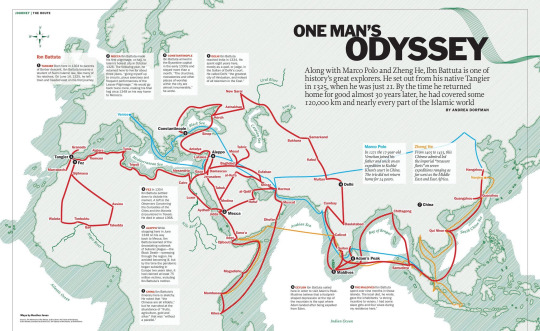
View On WordPress
8 notes
·
View notes
Text
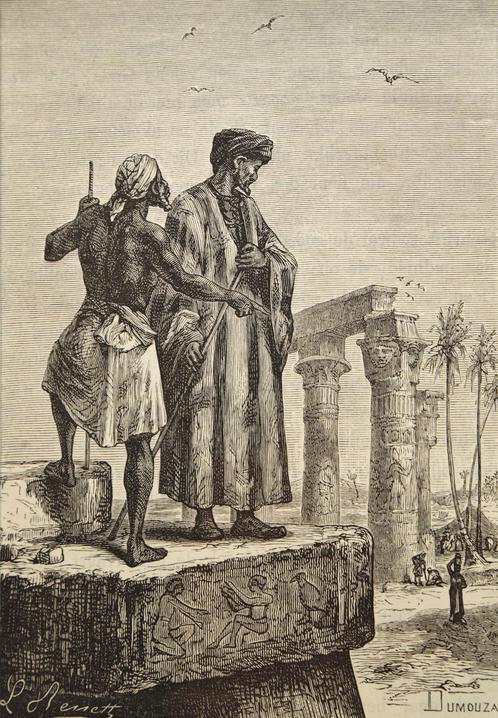
Ibn Battuta and his guide in Egypt (Léon Bennett, 1878)
25 notes
·
View notes
Text
Ibn Battuta's Travels

“The Gift of the Beholders on the Peculiarities of the Regions and the Marvels of Journeys.”
In Arabic, Tuḥfat al-nuẓẓār fī gharāʾib al-amṣār wa-ʿajāʾib al-asfār, or Rihlah (Travels) for short.
Ibn Battuta was a medieval Muslim traveler who wrote one of the world’s most famous travel logs, the Riḥlah. This work describes the people, places, and cultures he encountered in his journeys along some 75,000 miles (120,000 km) across and beyond the Islamic world.
Ibn Battuta’s Riḥlah has tremendous documentary value because of its detailed accounts of social, cultural, and political aspects of much of the Islamic world during the 14th century. His unique and mostly reliable historiography is valuable for the study of history.
#ibn battuta#rihlah#14th century history#islamic history#muslim history#medieval muslim traveler#white erasure#history
6 notes
·
View notes
Photo
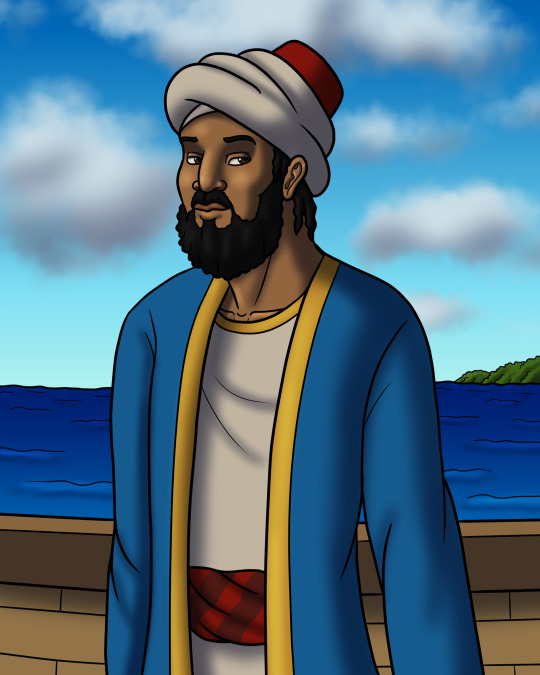
Ibn Battuta (1304-1369 AD) was a Moroccan explorer and scholar who was among the most well-traveled men recorded in the annals of the Middle Ages. Over the course of his life, his adventures, which he recorded in his travelogue The Rihla, took him as far afield as Mali in West Africa, the Swahili town of Kilwa on the coast of Tanzania to the south, and the Indies and even China to the east. He is thought to have traveled more miles than any other explorer in the pre-modern era, with the Chinese sailor Zheng He coming up in second place and the Italian Marco Polo at third.
6 notes
·
View notes
Text
parents of ibn battuta: ok so the point of hajj is to travel to mecca and convert more muslims, then come back after a year or so
ibn battuta: hmmm idk man. i might just not come back
parents of ibn battuta, concerned: what. but son. you’re guaranteed to have a respectable and promising career here
ibn battuta: well i’ve been having this craving to travel the entire world as we know it
entire family of ibn battuta: you’d just???? leave us????
ibn battuta: yeah i just feel like going on the most iconic backpacking trip ever. might even meet over sixty world leaders on the way.
entirety of tangier, morocco, at this point: that’s impossible. just don’t. we’ll miss you. please. we’d lose contact with you for decades.
ibn battuta:

#dude was crazy#historic figure#world travel#hajj#ibn battuta#culture#road trip of the century#intelectual
1 note
·
View note
Note
Would you ever write a soulmate AU (with Holland/Vortalis or in general)?
Fuck yes, would write a Holland/Vortalis soulmate au like a shot, with my own twists because I'm a contrarian. Soulmates not as pre-destined partners but as little...nudges from the universe: these are the people who will hold you steadiest, on your current path. Not merely lovers, though they often are. But Vor's last exchange with many of those who kill Gorst's guards with him has appeared on his skin; ever-shifting, as they make their different choices.
A Ros Vortalis who's watched so many words fade, leaving pristine skin in their wake. As he boarded one ship instead of another, never having even caught sight of the word-smith. Once, even as he cut a throat, too caught up in the adrenalin of fighting to know there was a different sort just beneath it. But for all he doesn't believe in fairy tales, for all the pain, he still heeds them. It usually goes to shit, but oh, the getting there is worth it.
Tracking down the Antari was a given even without the words that appear framed in snowdrops across his chest just as he crosses the wood's boundary. He and Gorst are about at that moment where they've had all the shit, they'll stand from each other. Won't be long before their vaunted king decides to pull one of Vor's inner circle into the blood square. And if it comes to that, Ros Vortalis will become every other king, soaked in the magic you can't come back from. Because for all his grand visions, when the chips are down, he'll give friends loyalty as good as he's gotten. Time to get creative, before the whole city suffers.
That said, they definitely sweeten the proposition. He's had more people than it's worth totting up point him to the door. A man who wanted to be king trailed blood in his wake. Man like that was likely to get people you cared about caught in his messes. What would it feel like when this person whispered: "Stay with me." Seems he'll find out, if he tracks down this Antari. (Not that he expects it to be the _Antari himself for crow's sake, but he never said no to a challenge.)
Since Talya's death, Holland has had a patch of ink, with something too smudged to make out. After all, the last thing Ros Vortalis tried to say resulted only in blood. But words change. If the prickle of them shifting hadn't half-woken him, Talya might have plunged her blade all the way in. He'll change these words to something kinder should he ever meet this person.
So much flirting! You know that gag in A Knight's Tale where Jocelyn doesn't give Will her name for ages? Please picture "ask me to kill a king when you know both parts of my name" Holland Vosijk, and fuck Vor is _so into it as he stalks the Kosik to find someone who knows what the Antari's name is. Meanwhile, _so _much sex or platonic cuddling or both. This will probably go to shit, but the etched words are as close as they'll ever come to the universe telling them this person is as trustworthy as it gets in Makt. And for Holland, especially, when he gets that all-over prickle, he's had only once before as his wrist throbs madly, all he can think is it's been _so _long since he's dared be touched his skin aches with it. Until this one decides to kill him, he's taking advantage.
#am done! with the second of six! history papers for the semester gods save me. this time dealing with Zheng He. Mehmed II. and Ibn Battuta#so can now roll around in this glorious scenario. which i now really fucking wanna write. or see someone else write#Ros Vortalis#Holland Vosijk#Holland Vosijk/Ros Vortalis#Shades of Magic
5 notes
·
View notes
Text
Yes, the world was vast and travel was expensive and dangerous and most people never left for any far places, away from their hometowns, before the modern age, before travel became easier and affordable.
And yet, and yet there is ALWAYS a story in medieval travel literature how these people run into locals while they're in fucking China. And yes, granted, of course you'll meet traders in a tradehub. But Fabri runs into a Mameluk, who he knew when he was a Christian in fucking Basel. The goddamn odds.
#beablabbers#I don't think Ibn Battuta was a trader but he kept running into trading families from back home abroad according to what I heard#and yeah the Villani chronicles are supported with news from far abroad bc florentine traders went EVERYWHERE#but Fabri's encounter is baffling me a bit.#grau mein freund ist alle theorie
5 notes
·
View notes
Text

#Normally care of Muslim ☪️ historical heritage of Shanghai in Chinee 🇨🇳 and the World 🇺🇳 ! 👏🏼🌟👍🏼#Ref.#Unesco.org 🇺🇳#WMF.org 🇺🇳#Morocco 🇲🇦 Ibn Battuta explorer.#Italy 🇮🇹 Marco Polo explorer.
0 notes
Text
In the philippines, the Moroccan traveller Ibn Battuta was well loved bc one of the princesses he mentioned in his stories, Princess Urduja, the warrior, was thought to be from the Philippine mandala of Pangasinan. His travels are something that always fascinated me- it was nice reading about the medieval world outside of Europe, from the eyes of someone who was an Islamic scholar- far removed from the European world.
Thinking about how during the black plague was one of the worst times to be Jewish in Europe, because, oh well, everytime a calamity in Europe happens, Jews were always the first to become the scapegoats.. but when Ibn Battuta travelled to Syria, where the black plague had spread as well, all he saw were Christians, Muslims and Jews praying together, parading in the streets holding up copies of the torah, the quran and the bible- Europeans viewed the bubonic plague as something they needed to atone for- so they ended up massacring their Jewish populations, but in places like Damascus, it was seen as something one must withstand, or one of G-d's Unknowable ways- No one needed to "pay"- community must endure. I don't know! This is just something I think about a lot.
300 notes
·
View notes
Note
Hi there! I read your post about Egypt and Cleopatra, and now I am really curious about the African Kingdoms you mentioned and was wondering if you could tell us more about them please, they sound really interesting.
Oh, there's SO much I could tell you, and there's so many African kingdoms that have been woefully understudied--and many more aside from the ones I mentioned. They all have their own rich histories, cultures, political intrigue, and it's an actual tragedy that they aren't discussed more. I'm still researching myself, so I'll just review some of my favorite things from each kingdom.
Aksumite/Axumite Empire: Located in modern-day Ethiopia, this empire existed from the 1st to 8th century CE, though its prime was from the 3rd to 6th centuries CE. The Axumites converted to Christianity of their own free will over 1,000 years before colonialism and as a result have ancient churches, some made of stone and carved from the earth itself. They also were the first African kingdom to mint their own coins, and their capital city of Axum had, at its peak, 20,000 people living in it. Also, I love the Dungur palace. Here's a reconstruction of what it looked like:
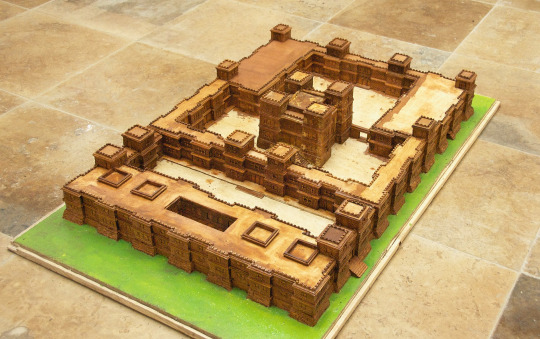
LOOK AT IT.
Source: x
Kongo: Located in central Africa around modern-day Angola and the Democratic Republic of the Congo from the fourteenth to the twentieth centuries. This kingdom had a rich social hierarchy, apparently had ambassadors to Europe, and some people practiced Catholicism, which led to their own branch of Christianity led by a woman named Beatriz Kimpa Vita in the 1600s who believed she had visions that informed her Jesus actually came from Kongo. Yeah.
Sources: x, x
Loango: A neighbor of Kongo, but one we know much less about due to Kongo having a long, well-documented history of interacting with Europe (see: the ambassadors), and Loango... does not. But we do know they also had a rich social hierarchy, and we have this map of their capital city.

Sources: x, x
Great Zimbabwe: From 1100- 1500, located in modern-day Zimbabwe, this was a city of the Zimbabwe empire that was either used for storing grain or as a royal residence. Either way, the ruins of said city look like this:
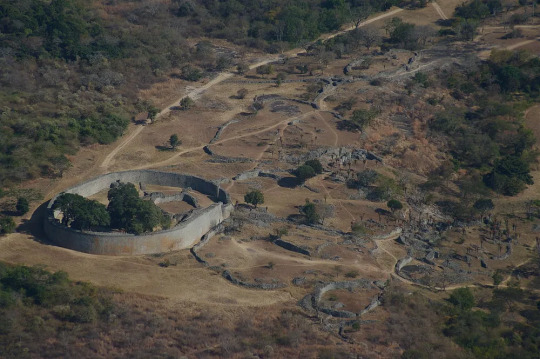

Here's a reconstruction:
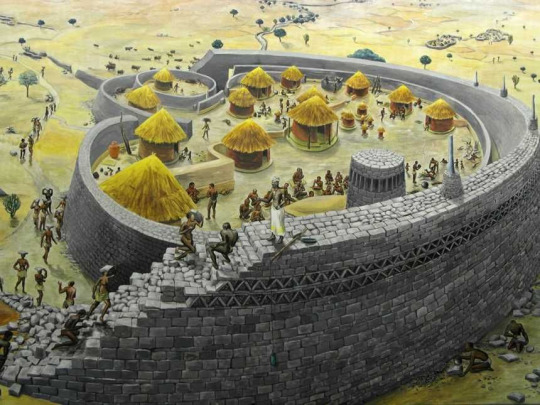
Sources: x, x, x, x
Ghana/Mali/Songhai: These were three successive empires from West Africa, with Ghana being the first from the 7th to 13th centuries, Mali being the second from the 13th to 16th centuries, and Songhai being the last one from the 15th to 16th centuries. If you learn about a non-Egyptian African civilization at all in school, chances are it's the Ghana empire and its successive empires, and they're most famous for gold, Timbuktu (with its ancient mosques, library, and university), and Mansa Musa.

Sources: x, x, x, x, x
Ashanti/Asante Empire: Located in modern day Ghana, this kingdom lasted from the eighteenth century to the twentieth century. This kingdom is most well-known for its role in the slave trade. The Ashanti had well-built roads and architecture, and a little fun tidbit about them is that, after the introduction of guns, they actually had a minor firearms industry.
Here's their capital, Kumasi:
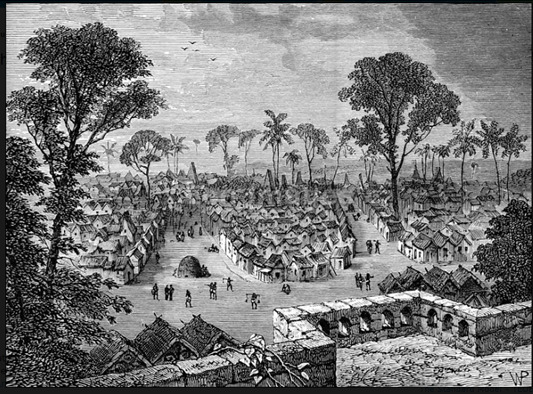
Source: x, x
Swahili Coastline: The coastline was made up of MANY city-states that saw their prime in the 11th to 15th centuries--including Mombasa, Zanzibar, and Kilwa--that participated in the Indian Ocean trade route, and pottery from as far away as China has been found in these cities. Many of these cities also practiced Islam and had their own mosques. Kilwa is my personal favorite:
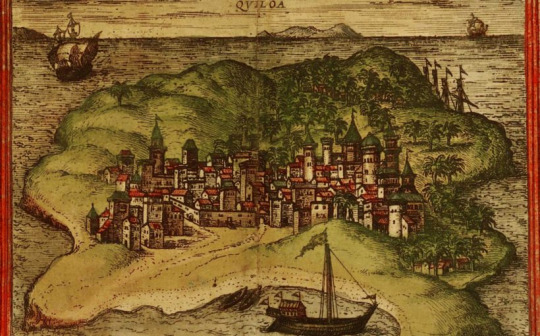
These cities were built of stone, but Kilwa's palace, in particular, was built of coral. Its architecture led to the city being described by Ibn Battuta as one of the most beautiful in the world, which is part of why it's so fascinating to me.
Source: x, x
Of course, this barely scratches the surface. There are many more kingdoms all over the continent and a variety from ancient and pre-medieval times that deserve much more love.

And this image doesn't even cover them all!
So yes, ancient and medieval Africa deserve much more love, more research and more hype, and hopefully one day soon they'll get just that.
67 notes
·
View notes